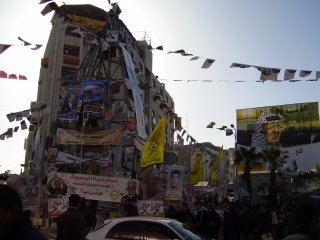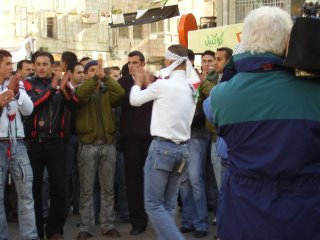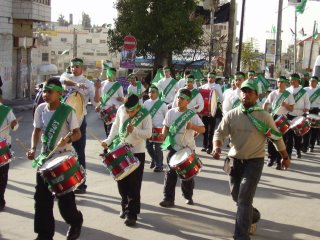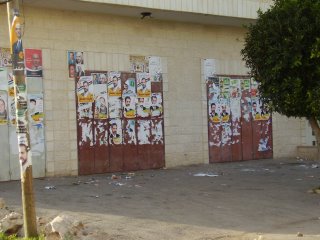Tuesday, January 24, 2006
Real Democracy in the Middle East (no it is not Israel)
In East Jerusalem you could be forgiven for not knowing that there was an election going on. You could not find a single poster in the city. There was no information on candidates, who to vote for or how. When I crossed over into Ramallah however I saw something very different.
Even before I reached Ramallah standing at the Qualandia checkpoint there were posters for the election everywhere. The service taxi's (a hybrid between a bus and a taxi) were shrines for various political factions. They were covered in stickers and posters inside and out. Flags and political murals likewise decorated the service's. Different service's played different songs supporting various factions, in a style that one could easily dance to. Even as the service's were taking off campaigners would stick more stickers on the windows.
In Ramallah the election fever was even more extreme. You could barely find a single shop that didn't have a candidate in the window (sometimes 10). From cafe's to hardware stores, to mainstream clothing and video outlets, they all presented their candidates. Banners were hanging every few meters across the streets with different factions represented. Cars, like the service taxi's, were covered to the brim in material. Some of them were even loudhailing the songs that I heard in the Taxi.

Houses down back streets were being used as campaigning centres as everyone set out promoting their material. Newspapers were being handed out on the street as well as pamphlets saying what the candidates stood for. The posters carried various symbols of Palestinian struggle with handcuffed pictures of candidates being a promotional point in material. Many of the posters also had pictures of Arafat and people who had been assassinated by Israel. Whilst in Australia most posters in the elections are limited to the smiling face of the candidate (or the leader of the party) with no description whatsoever, these posters had content.
Whilst I cannot read Arabic they had a fair few words on them, long slogans at the very least. Those that I had translated contained demands such as the right of return for Palestinian Refugees, and for a Palestinian capital in Jerusalem. There were also several small rallies that were taking place.

In the city square Fatah was holding a rally of about 150 people whilst only a few blocks away Hamas held a marching band of about 60 young people mostly about 6-15. I don't know enough about the young people here to comment on their political awareness, although I have my reservations about this.

Even in the small town of Bil'lin the town was plastered with posters and had a local Fatah campaigning centre.

I wondered, given that the passion here [in Bil'lin and Ramallah] was so high, why wasn't there any sign of the election taking place in East Jerusalem? According to the ISM media co-ordinator campaigning for the election has been banned by the Israeli government. Only 5,000 of the 200,000 Palestinians in Jerusalem will be eligible to vote in this election. People are able to vote only by obtaining tickets which were in limited number (I will find out more about this tomorrow).
At this stage it looks like Hamas will win. Hamas is expected to win for a few reasons. The first is a belief by many of the Palestinians that Fatah is corrupt. Fatah certainly has lacked internal democracy having not had a National Congress since 1989. This allowed Fatah and the PA leadership to act without scrutiny in the name of unity. Fatah has also been seen to compromise too much with Israel at times, such as in the Oslo accord when they agreed to Israel maintaining the Israeli roads and settlements that relegate any future Palestinian state to a series of bandtustan. Some of the people I spoke to defending Fatah felt that this election was a real shaking up of Fatah and that the Fatah list contained an emerging leadership that is different to the old Fatah.
The charges of corruption where not helped by allegations that the US is backing Fatah. The Washington post put out an article By Scott Wilson and Glenn Kessler:
Even before I reached Ramallah standing at the Qualandia checkpoint there were posters for the election everywhere. The service taxi's (a hybrid between a bus and a taxi) were shrines for various political factions. They were covered in stickers and posters inside and out. Flags and political murals likewise decorated the service's. Different service's played different songs supporting various factions, in a style that one could easily dance to. Even as the service's were taking off campaigners would stick more stickers on the windows.
In Ramallah the election fever was even more extreme. You could barely find a single shop that didn't have a candidate in the window (sometimes 10). From cafe's to hardware stores, to mainstream clothing and video outlets, they all presented their candidates. Banners were hanging every few meters across the streets with different factions represented. Cars, like the service taxi's, were covered to the brim in material. Some of them were even loudhailing the songs that I heard in the Taxi.


Houses down back streets were being used as campaigning centres as everyone set out promoting their material. Newspapers were being handed out on the street as well as pamphlets saying what the candidates stood for. The posters carried various symbols of Palestinian struggle with handcuffed pictures of candidates being a promotional point in material. Many of the posters also had pictures of Arafat and people who had been assassinated by Israel. Whilst in Australia most posters in the elections are limited to the smiling face of the candidate (or the leader of the party) with no description whatsoever, these posters had content.
Whilst I cannot read Arabic they had a fair few words on them, long slogans at the very least. Those that I had translated contained demands such as the right of return for Palestinian Refugees, and for a Palestinian capital in Jerusalem. There were also several small rallies that were taking place.

In the city square Fatah was holding a rally of about 150 people whilst only a few blocks away Hamas held a marching band of about 60 young people mostly about 6-15. I don't know enough about the young people here to comment on their political awareness, although I have my reservations about this.

Even in the small town of Bil'lin the town was plastered with posters and had a local Fatah campaigning centre.

I wondered, given that the passion here [in Bil'lin and Ramallah] was so high, why wasn't there any sign of the election taking place in East Jerusalem? According to the ISM media co-ordinator campaigning for the election has been banned by the Israeli government. Only 5,000 of the 200,000 Palestinians in Jerusalem will be eligible to vote in this election. People are able to vote only by obtaining tickets which were in limited number (I will find out more about this tomorrow).
At this stage it looks like Hamas will win. Hamas is expected to win for a few reasons. The first is a belief by many of the Palestinians that Fatah is corrupt. Fatah certainly has lacked internal democracy having not had a National Congress since 1989. This allowed Fatah and the PA leadership to act without scrutiny in the name of unity. Fatah has also been seen to compromise too much with Israel at times, such as in the Oslo accord when they agreed to Israel maintaining the Israeli roads and settlements that relegate any future Palestinian state to a series of bandtustan. Some of the people I spoke to defending Fatah felt that this election was a real shaking up of Fatah and that the Fatah list contained an emerging leadership that is different to the old Fatah.
The charges of corruption where not helped by allegations that the US is backing Fatah. The Washington post put out an article By Scott Wilson and Glenn Kessler:
"A leader of Hamas, formally known as the Islamic Resistance Movement, called for an investigation into whether the $2 million program violated the prohibition against parties receiving funds from foreign sources. U.S. Officials involved in the program said it was not meant to favor one party, but the Palestinian public closely identifies the Palestinian Authority with the Fatah movement that runs it."
The US and Israel have long hated Hamas who they see as Islamic Terrorists. Very little of what I have seen of Hamas in this election is related to Islam. One Palestinian man I talked to said "I might vote for Hamas simply because the US doesn't like them." People seem to think Hamas will stand up to Israel where Fatah didn't. From what I and others have seen there is barely a mention of Islam in Hamas' campaign (at least in the West Bank). T
he only references to Islam I saw was one tiny reference in a song about Hamas played in the service (which simply talked about the strength of Islam rather then any fundamentalist policies) and the Islamic Cresent behind the picture of a Hamas leader who was assassinated by Israel. Amongst the very large numbers of flags I've seen being waved about I haven't seen a single Islamic flag. One of the interesting things in this election is that all lists in the election need to have a certain number of women, Hamas' list is no exception which does challenge some of our notions of fundamentalism.
That is not to say that there isn't an Islamic element to Hamas but it is unclear how it will play itself out and they clearly aren't winning people to Hamas (from what I have seen) on the basis of Islam but on resistance to the occupation. Organisations change over time (for better or worse) Hamas is no exception. Ironically despite Israel and the US labeling Hamas as the main threat, the missiles being launched from Gaza as well as the kidnappings that are happening there seem to be being caused by the al-Aqsa Martyrs Brigade. The Brigade has been loosely affiliated with Fatah and every Fatah election poster I saw displayed the logo of the al-Aqsa Martyrs on it. Although, I think the al-Aqsa Martyrs Brigade are probably fairly heterogeneous and isolated sections do things in various areas.
It wouldn't be the first time the US or Israel, in accordance with their interests, has blamed the larger political threat for being the biggest security threat.
There are also a few individual candidates worth keeping an eye out for. Key among them is Marwan Barghouti who is of Fatah but is not endorsed by Fatah. He was jailed in 2002 for allegedly being a leader of the al-Aqsa Martyrs Brigade. Barghouti is still seen as a symbol of Palestinian struggle and if he wins from jail the movement to have him released will surge. Even with the 2 major parties it seems that many people will vote for smaller groups and individuals with Fatah and Hamas generally recieving less then 30% each in the opinion polls.
[So there are some of my initial thoughts on the situation at the moment. I have probably made a lot of errors in here and I am still trying to work my way around Palestinian politics but hopefully my observations are useful]
